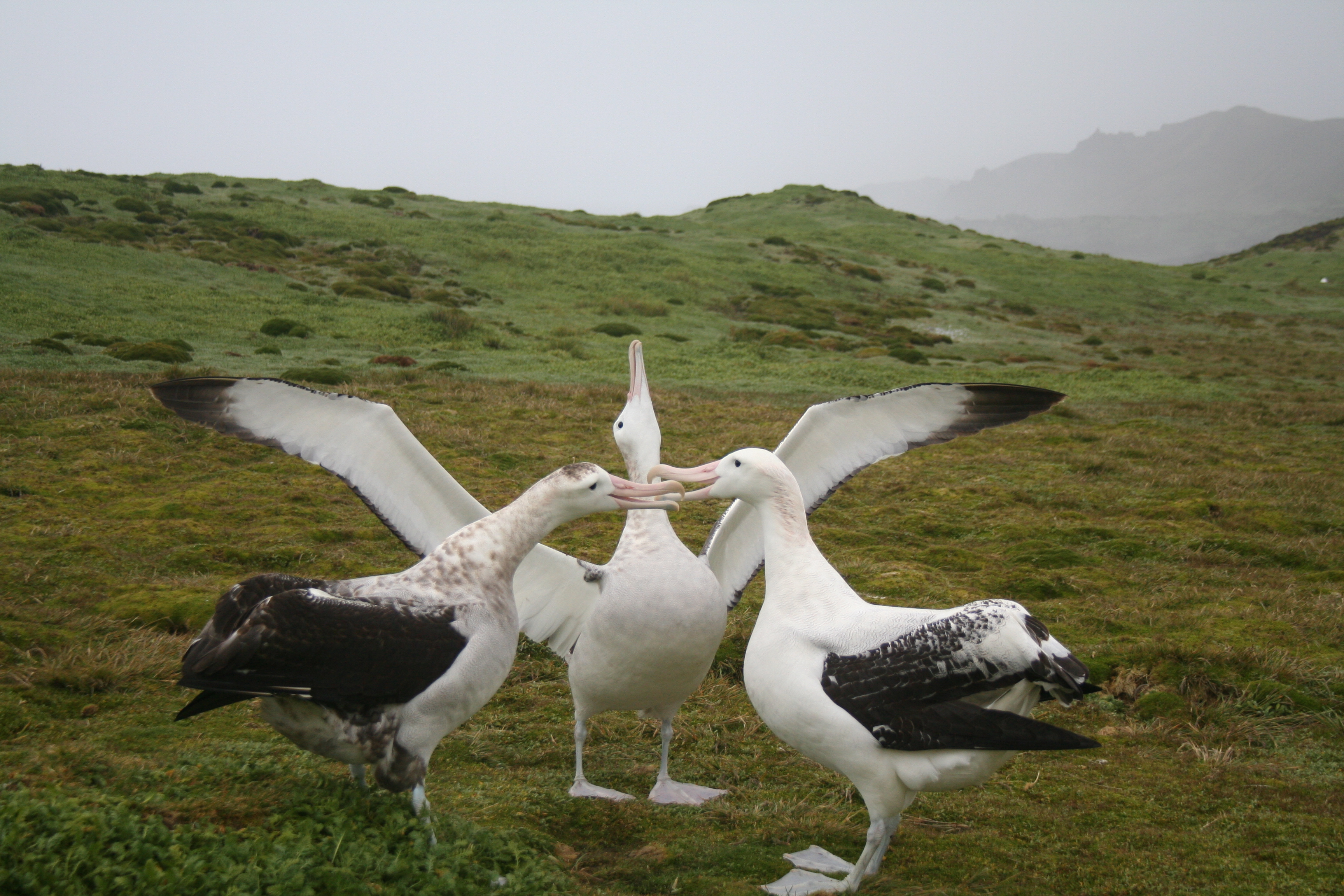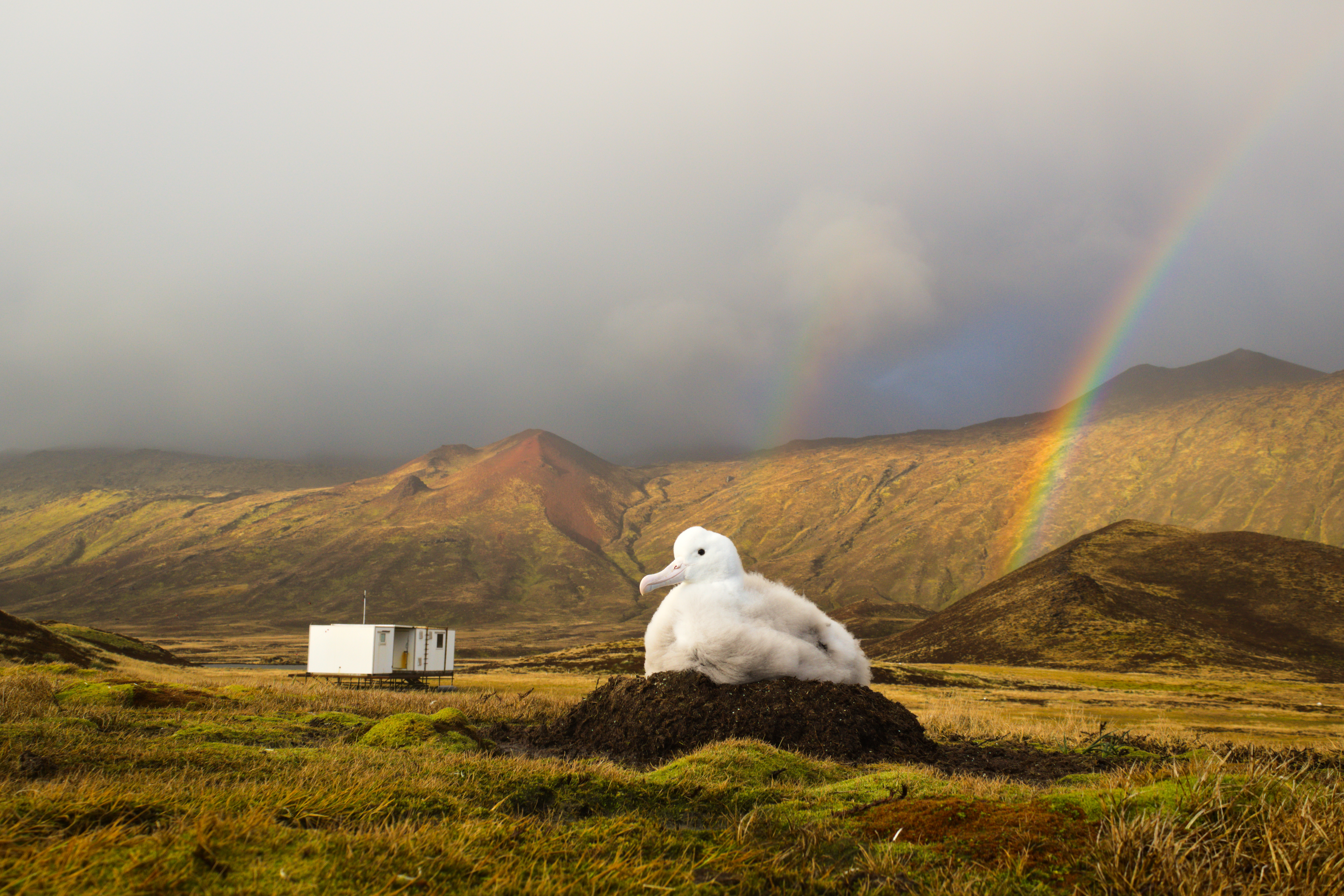
A “gam’ of young Wandering Albatrosses engage in mutual display on Marion Island, photograph by Alexis Osborne
BirdLife South Africa has joined the Island-Ocean Connection Challenge (IOCC), a global initiative aiming to restore, rewild and protect islands, oceans and communities (click here). This aims to support its work in partnership with the South African Department of Forestry, Fisheries and the Environment via the Mouse-Free Marion (MFM) Project to save internationally significant albatross populations, such as of the Vulnerable Wandering Albatrosses Diomedea exulans, that are at risk from introduced House Mice Mus musculus on Marion Island. At a little over 30 000 hectares, the removal of mice from Marion Island will be the largest rodent eradication project in the world to be undertaken in a single operation.
The IOCC aims to restore and rewild 40 globally significant islands worldwide by 2030, from sub-Antarctic islands like Marion Island to tropical islands bursting with colourful marine life and coral. Restoring islands by removing invasive species has been repeatedly proven to be one of the most impactful ways to restore biodiversity and island ecosystems. There have been more than 1000 successful island invasive species eradications worldwide that have resulted in long-term benefits, including increased populations of seabirds, land birds and native plants, recovery of natural ecosystem functions, protected and thriving reefs and a more climate-resilient island.
Mark D. Anderson, CEO, BirdLife South Africa and Chair of the MFM Project Management Committee, explains: “Islands are biodiversity hotspots and therefore provide a crucial focus for global conservation efforts. We have joined the IOCC to add impetus to international actions restoring islands by tackling the important environmental issue of invasive alien species. Marion Island is home to two million seabirds, including four species of albatrosses and a range of other species including petrels and penguins, several of which are threatened with extinction. It is vital that we remove the invasive mice, as otherwise Wandering Albatrosses – arguably the most iconic of the ocean-wandering seabirds – and the majority of Marion Island’s globally important seabirds, could become locally extinct.”
“Rodent-free islands offer a glimmer of hope in the fight against climate change and biodiversity loss. Successful eradications have shown that islands can recover to their former ecological condition in a relatively short time. Joining the IOCC will help raise awareness of the current risk posed to Marion Island, and the urgency needed to prevent the worst-case scenario from happening. We are delighted to have joined this important worldwide initiative and, by being part of it, look to make a step-change in protecting Marion Island’s biodiversity forever.”
Dr Anton Wolfaardt, MFM Project Manager, adds: “Put simply, if we can remove invasive mice from Marion Island we can address once and for all one of the significant threats that the island’s seabirds face, and thus facilitate a favourable conservation future for this globally important island and its magnificent seabirds. Rather than containing or mitigating the threat, we solve it. Although the seabird populations on Marion Island are being increasingly impacted by mice, we have an opportunity to intervene to remove that threat and allow the seabird populations to recover naturally without the need for species reintroduction programmes.”
“The global importance of the seabird populations on Marion Island cannot be overstated, so we must do everything in our power to protect them. Becoming part of the IOCC will help us achieve this goal and contribute to global biodiversity objectives.”

A double rainbow frames a Wandering Albatross chick on Marion Island’s west coast near Swartkop Point, photograph by Sean Evans
Dr Penny Becker, Vice President Conservation at Island Conservation and a co-founder of the IOCC, writes: “Restoring and rewilding islands is not just an act of conservation; it is one of our most powerful defences building resiliency against climate change. By nurturing these ecosystems, we build stronger environments and help biodiversity hotspots like Marion Island to recover”.
Watch a short video about this globally important initiative and find out more about the MFM Project from here.
John Cooper, Emeritus Information Officer, Agreement on the Conservation of Albatrosses and Petrels, 31 October 2023

 Español
Español  English
English  Français
Français